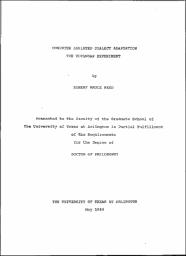
ATTENTION: The works hosted here are being migrated to a new repository that will consolidate resources, improve discoverability, and better show UTA's research impact on the global community. We will update authors as the migration progresses. Please see MavMatrix for more information.
Show simple item record
| dc.contributor.author | Reed, Robert Bruce | |
| dc.date.accessioned | 2020-10-07T20:57:08Z | |
| dc.date.available | 2020-10-07T20:57:08Z | |
| dc.date.issued | 1986-05 | |
| dc.identifier.uri | http://hdl.handle.net/10106/29475 | |
| dc.description.abstract | This dissertation provides the theoretical basis for a computer program that adapts textual material from one language of the Tucanoan family to another. Tucanoan languages are spoken by small groups living in southeastern Colombia, northwestern Brazil, northern Peru, and northern Ecuador. This work represents the first attempt to apply principles of machine translation and computational linguistics to indigenous languages of Colombia. It discusses aspects of translation theory relevant to machine translation. Some features of the Tucanoan languages relevant to the adaptation process are discussed in depth, including differences in suffix systems marking case, noun classifiers, and the evidential systems of the various languages. Of particular interest for automated parsing is the problem of null allomorphs of certain morphemes. | en_US |
| dc.language.iso | en_US | en_US |
| dc.publisher | University of Texas at Arlington | en_US |
| dc.subject | Applied sciences | |
| dc.subject | Language | |
| dc.subject | Literature and linguistics | |
| dc.title | COMPUTER ASSISTED DIALECT ADAPTATION: THE TUCANOAN EXPERIMENT | en_US |
| dc.type | Dissertation | en_US |
| thesis.degree.department | Humanities | |
| thesis.degree.name | Doctor of Philosophy in Humanities | |
Files in this item
- Name:
- Computer Assisted Dialect ...
- Size:
- 9.047Mb
- Format:
- PDF
- Description:
- PDF
This item appears in the following Collection(s)
Show simple item record


